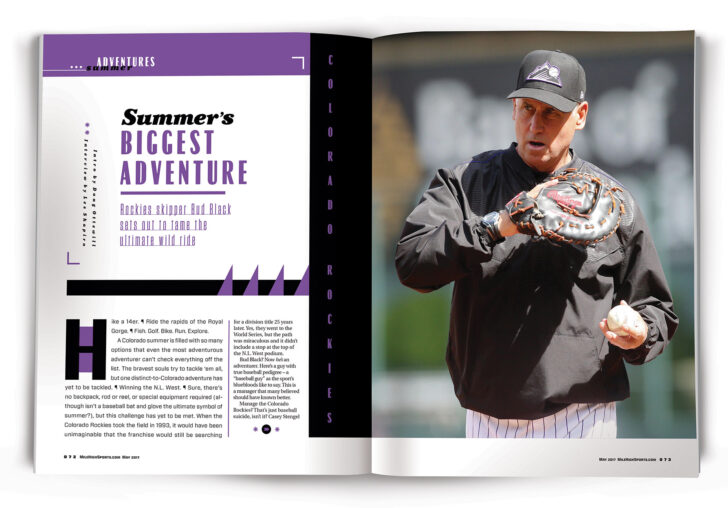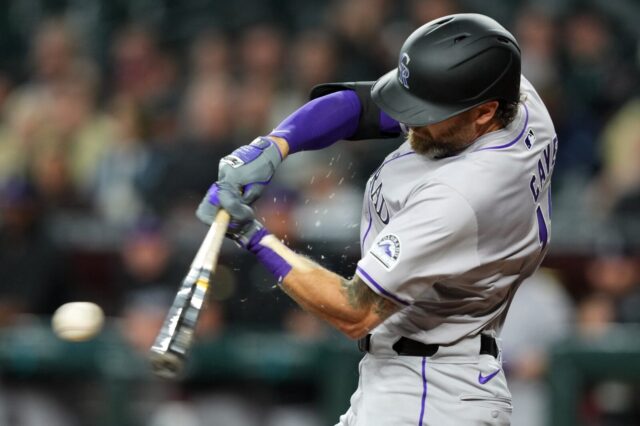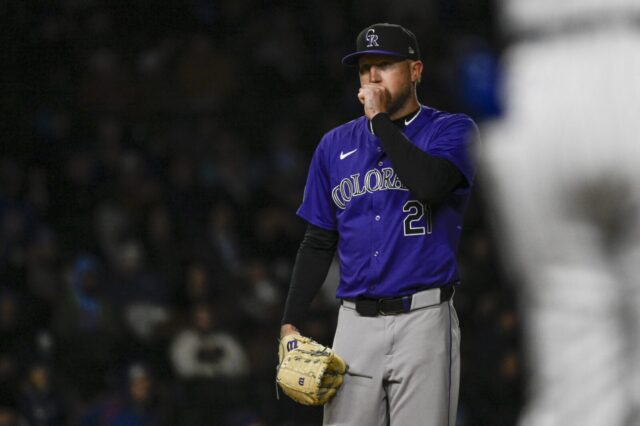This story originally appeared in Mile High Sports Magazine. Read the full digital edition.
Hike a 14er.
Ride the rapids of the Royal Gorge.
Fish. Golf. Bike. Run. Explore.
A Colorado summer is filled with so many options that even the most adventurous adventurer can’t check everything off the list. The bravest souls try to tackle ‘em all, but one distinct-to-Colorado adventure has yet to be tackled.
Winning the National League West.
Sure, there’s no backpack, rod or reel, or special equipment required (although isn’t a baseball bat and glove the ultimate symbol of summer?), but this challenge has yet to be met. When the Colorado Rockies took the field in 1993, it would have been unimaginable that the franchise would still be searching for a division title 25 years later. Yes, they went to the World Series, but the path was miraculous and it didn’t include a stop at the top of the NL West podium.
Bud Black? Now he’s an adventurer. Here’s a guy with true baseball pedigree – a “baseball guy” as the sport’s bluebloods like to say. This is a manager that many believed should have known better.
Manage the Colorado Rockies? That’s just baseball suicide, isn’t it? Casey Stengel couldn’t win at 5,280 feet above sea level. Yet, like the many daredevils and risk seekers who inhabit our fine state, Bud Black didn’t blink when it came to accepting this challenge. He dove right in.
And the weird thing is that he immediately began to work on the one thing they say can’t be done here – pitching. And what do you know? Just a month into the season, the Rockies were sitting atop the NL West and they’ve done it with – you guessed it – pitching.
Now, that may or may not last all summer, but I’m here to tell you that Bud Black is a guy worth watching. He and Rockies GM Jeff Bridich just might have the secret to crafting and molding a respectable pitching staff that’s rarely given the benefit of the doubt.
Speaking of adventures, when I was a kid, I used to venture out to Kansas City to watch the Royals play. Kauffman Stadium (then just “Royals Stadium”) was the closest major league ballpark to Denver. My dad and I would road trip it out to K.C. to see real baseball. And when we got there, Bud Black was waiting, many times toeing the mound for the Royals. Black pitched six seasons with the Royals, right in the heart of my childhood. In 1985, he won 10 regular season games and pitched in five different postseason games (two as the Royals starter); the Royals went on to win the World Series.
In a way, I’ve been cheering for the Rockies’ new skipper for more than 30 years.
So, when he came to Colorado, I – like so many Rockies fans – was genuinely excited. If the early season results are an indicator, he’s a great hire.
Our own Les Shapiro had the chance to sit down with Bud Black early in the season. They talked baseball, and the adventure of managing the Rockies.
***
Les Shapiro: I wonder, after all the time you spent in San Diego, is it still a weird feeling to look across and see the Padres uniform and you’re wearing the Rockies’ purple and silver and black?
Bud Black: A little bit, but not as much as you’d think. I think last year, getting back in an Angels uniform sort of buffered that feeling a little bit. And in all honesty, I think the Padres roster has turned over so much where so many of the players that I had, especially the latter part of my tenure, have since departed. They’re going through a pretty full rebuild, so a lot of the players I’m not familiar with, and even a lot of the staff, I’m not familiar with. So, in this game of professional sports, things are constantly changing, people are moving. So, in regards to that, you know, that was a great part of my career, no doubt, when you’re there for nine seasons. But I’m so excited about the new challenge here in Colorado.
You’ve been with a few organizations, what have you found to be unique about the Rockies organization?
You’re right. Every organization’s different. There are 30 of them. Every team has its own uniqueness to it. What I’ve found here, just in a short period of time, I think the people here are true Rockies. I think that when you look at ownership, you look at Dick and Charlie [Monfort], you look at the people at the top of the organization. These people have been here a long time, and they truly are passionate about their team. They care about the city; they care about the players. And even the guys in the front office, Jeff [Bridich] being relatively young, has been here a while. And so has Mark Wile and Zack Rosenthal and Zach Wilson, the guys who head up the baseball operations department. Our clubhouse guy has been here for a long time. Our visiting clubhouse guy has been here – maybe the first Rockies employee. So, what I’ve found is that there’s a strong sense of loyalty to Rockies baseball, which I think maybe sets them apart from other organizations.
Alright, let’s talk some baseball. The season is here, and I would imagine that you walk in here every day and you enjoy filling out the lineup card because you’ve got guys that can hit the baseball, where in San Diego, it seemed you had to squeeze out the runs every night. What’s that feel like now?
You’re right, it’s a different group of position players for sure. My first year in San Diego we had a pretty veteran-laden team. If you think back 10 seasons ago to even the play-in game with the Rockies – you know Brian Giles, Adrian Gonzalez, Mike Cameron was injured but he was on that club, Khalil Green, Marcus Giles, Geoff Blum – we had a veteran group of players, and then it changed over the years for a number of reasons. Here now, you look at this group of position players – Carlos Gonzalez, Ian Desmond, D.J. LeMahieu, Nolan Arenado, Charlie Blackmon, down the line. These are All-Star-caliber players, guys who’ve made All-Star teams, guys who have won batting titles.
Yet, at the beginning of Spring Training at least, I would imagine you felt maybe this team was snakebitten. The Ian Desmond injury, the David Dahl injury, Tom Murphy, the Chad Bettis health issues. Were you holding your breath when you walked in every day wondering what was around the corner next?
Yeah, you still do. In Spring Training you always cross your fingers when games move along and you get deeper into March, you see it across the landscape of baseball, and we were hit early with four guys who projected to make our team who are going to be big contributors. I mean you’re talking about a guy in the starting rotation who might have been our second game starter in Chad. And then our starting first baseman, our potential starting left fielder, and our potential starting catcher. Those are [some] big hits that we took. Again, nobody’s going to feel sorry for us. They don’t care about our injuries, the opposition. From our perspective, we need guys to hold the fort until these guys get back. They’re on the mend, which is a good thing. They’re in a good frame of mind as far as their attitude about coming back, so again, Mark Reynolds, Gerardo Parra, Dustin Garneau, Tony Wolters – these guys who are taking the place of the injured guys – have to come to the plate, have to play defense, and they have to contribute.
The starting rotation wasn’t all that experienced to begin with, and after some of the aforementioned injuries, you’re even younger at No. 4 and No. 5.
Well, you know it’s always an issue when you talk about experience. You cannot imitate big league atmosphere, big league game-like conditions in the minor leagues. You just can’t do it. But the thing that I like about our young players, whether it’s Kyle Freeland, German Marquez, Antonio Senzatela, Tyler Anderson – Jon Gray even, a year-and-a-half in the major leagues, not a great deal of service time for Jon – but these guys are competitors. They’ve got big hearts, they compete, they don’t scare off and they’ve got good stuff. Now, are they battle tested in the big leagues? No. That’s only going to happen over time, and we’re gong to have to be right there with them going through the growing pains of becoming a solid major league starting pitcher. But we feel good about who they are, and that’s a good thing.
You being a long-tenured pitcher yourself in the majors, how much do you, I know you have two pitching coaches in Steve Foster and Darren Holmes, but how much do you roll up your sleeves considering the lack of experience in your starting rotation? How often do you get down and dirty with these guys and talk to them about pitching?
Often. I’ve got a great deal of respect and admiration for the coaching ability of Darren and Steve, and I empower those guys to coach, but the pitching side is how I see the game. I sort of lay off the technical stuff, the mechanics and those types of things when those guys are in the bullpen working on things, and even a little bit of the advanced scouting, the pitch selection and so forth. I’ll let our advanced scouts and Holmy and Fosty handle that. But I’ll dig in a little bit on the mental side and some of the fundamental pitching principles that I think are important to our guys. So, with that, again it’s what I know best. My relationship with the pitchers will continue to be one of involvement, and that’s what I enjoy, the teaching aspect. I think between the three of us, we’ll get a handle on this pitching.
Some great news. Greg Holland looks like he’s close to being the guy he was in Kansas City a couple of years ago. What are you seeing from him? And how encouraging is it knowing that you have him closing out games now?
We feel good about where Greg is. The crispness to his slider, maybe another mile or two in velocity on the fastball, and the thing that I like, Greg feels really good about where he is, which is great. This guy’s a two-time All-Star, has pitched in playoffs, has pitched in World Series. This guy has been through it and he’s got a mental toughness to him that will rub off on our players. Him and Mike Dunn have been great additions to our bullpen, first and foremost in their ability, but also in who they are as teammates and as men.
How much are you looking forward to managing at Coors Field? That might be a little bit of an oxymoron because I don’t know a lot of guys who like managing at Coors Field.
I think the thing that I’m going to enjoy is managing the Rockies, wherever that is, in Denver or on the road. I know that our fans in Denver and across the Front Range and the regional aspect of our fan base is going to be great. It’s going to be cool. I felt that a little bit when I was in Kansas City as a player. When I was a Royal in the ’80s, how we attracted fans from across the Midwest. With Colorado, I sense that big fan base and people coming into Denver, coming into a beautiful ballpark like ours. We’ve got a good group of guys, and I think the young pitching over time will be something that our fans will be able to really be proud of. They’ll want to watch Jon Gray pitch. They’ll want to come and watch Tyler Anderson and Kyle Freeland and our young guys because they’ve got good stuff and they attack and they’ve got good fastballs and they work fast. All the things that I think are good stuff from a baseball perspective. When you’ve got Nolan Arenado and Carlos Gonzalez and D.J. and Desmond, these guys are fun to manage, man. The game starts, they’re engaged, they’re involved, the conversations are great in the dugout. Pregame, postgame, it’s all good. Again, we’ve got to do it on the field, that’s the number one priority. We have to win baseball games, and our guys know that.



